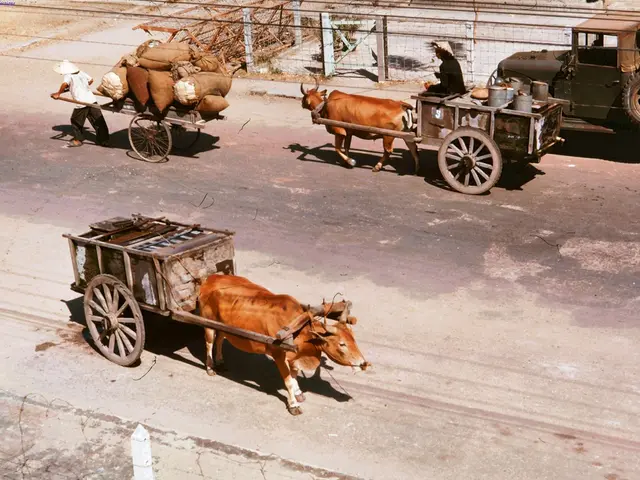Turkish forces standoff could potentially lead to a stalemate strategy by SDF.
In August 2025, the conflict between Turkey and the Syrian Democratic Forces (SDF) in northeast Syria continues to be a source of tension. The SDF, accused by Turkey of undermining peace efforts, has failed to comply with a March 2025 integration agreement signed between the SDF and the Syrian government, aimed at unifying governance in the region under Damascus.
Clashes between the Syrian government and the Kurdish-led SDF have been ongoing since early August, with casualties reported on both sides. The Syrian government has been massing forces near Raqqa and Deir ez-Zor, potentially preparing for a large-scale offensive that could significantly shift control in northeast Syria and escalate conflict risks.
Turkey's main concern is preventing the SDF, dominated by Kurdish groups linked to the PKK, from establishing an autonomous region along its border. Ankara seeks a strong, centralized Syrian state with the SDF dissolved or fully integrated into Syrian state institutions without autonomous status. However, Turkey is cautious not to jeopardize ongoing peace talks with Kurds inside Turkey, maneuvering politically to maintain domestic support while pushing the SDF to yield.
Several factors may influence the conflict's outcome:
- The stalled integration deal between SDF and Damascus, which, if implemented, could reduce hostilities but continues to falter amid mistrust and conflicting demands.
- Turkey’s military posture and willingness to intervene, which depends on how negotiations progress and whether the perceived Kurdish autonomy persists at its border.
- Syrian government’s military actions and alliances with local Arab tribes, which could tilt control away from the SDF if a large-scale offensive occurs in Raqqa and Deir ez-Zor.
- U.S. involvement or withdrawal, as the American presence has been pivotal in preventing escalations; U.S. support or restraint will heavily impact regional dynamics.
- Internal Kurdish dynamics and Turkish-Kurdish peace talks, which create internal pressures influencing SDF decisions on disarmament and negotiation strategies.
The U.S. continues to maintain limited support for the SDF, but its political commitment is wavering. Claims that the SDF fields 50,000-100,000 fighters are exaggerated, according to Syrian affairs expert Kutluhan Gorucu. Within the SDF's population, Kurds make up at most 19%, concentrated around Qamishli and Ayn al-Arab. South of the M4 highway, there is almost no Kurdish population.
Gorucu dismissed widespread speculation about targeted assassinations of SDF leaders, stating that the real objective would be territorial control and resource denial. The Kurdish-oriented DEM Party of Turkey spokeswoman urged Foreign Minister Hakan Fidan to "update his rhetoric," citing Turkey's ongoing peace process with Kurdish actors.
In Damascus, President Ahmed al-Sharaa faces limited military capacity and a weakened economy. Cooperation with Turkey offers him the possibility of regaining strategic areas and resources while relying on Ankara's military and intelligence assets. The United States continues to maintain limited support for the SDF, but its political commitment is wavering.
As negotiations progress, the risk of wider conflict remains high in northeast Syria. The stalemate in the integration agreement, Turkey's military posture, the Syrian government's military actions, U.S. involvement, and internal Kurdish dynamics all contribute to the complex interplay shaping the conflict. Without progress in negotiations or an external balancing force, the risk of escalation remains a concern.
- The conflict between Turkey and the Syrian Democratic Forces (SDF) in northeast Syria, ongoing since August 2025, is a significant source of tension.
- The Syrian government, with forces massing near Raqqa and Deir ez-Zor, may launch a large-scale offensive, potentially altering control in northeast Syria and increasing conflict risks.
- Turkey aims to prevent the SDF, predominantly Kurdish groups, from establishing an autonomous region along its border, desiring a unified Syrian state with the SDF dissolved or integrated without autonomy.
- The stalled integration deal between the SDF and the Syrian government poses a potential reduction of hostilities but continues to falter due to mistrust and conflicting demands.
- Ankara must navigate politically to maintain domestic support while insisting the SDF yield, even though ongoing peace talks with Kurds inside Turkey are in progress.
- Turkey's willingness to intervene depends on factors such as the progress of negotiations and the persistence of perceived Kurdish autonomy at the border.
- In Ankara's policy and legislation related to war-and-conflicts and politics, Syria, Turkish, Kurdish, and general-news play crucial roles as Turkey manages its complex relationships with the SDF, Syrian government, and other regional powers.






